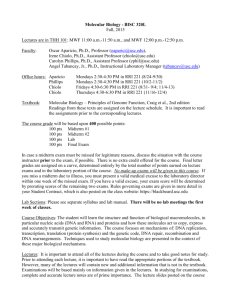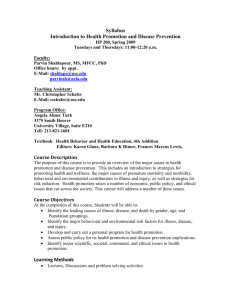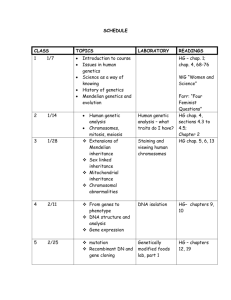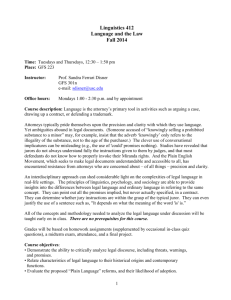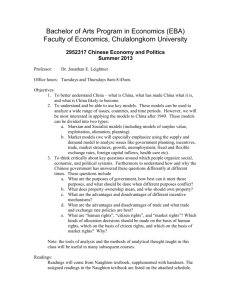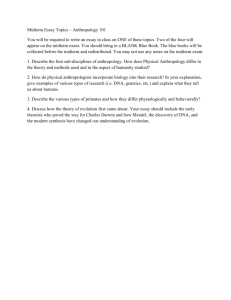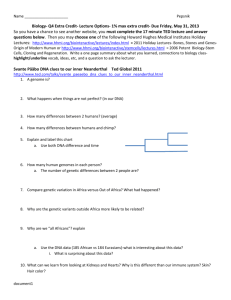Baker begins lecturing
advertisement
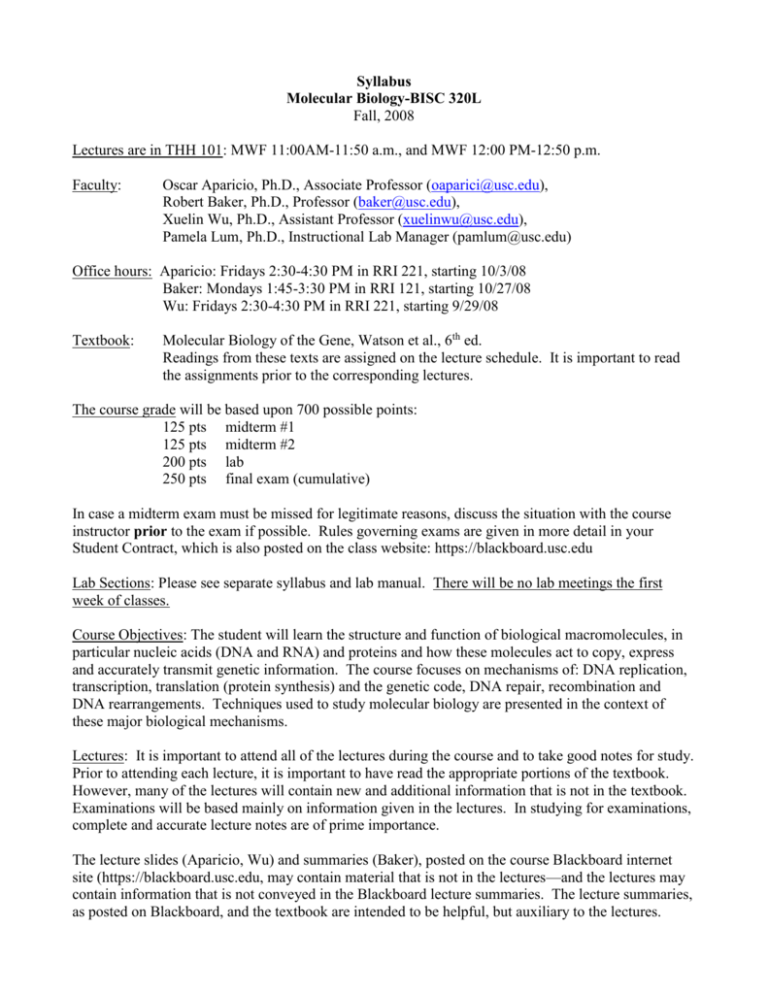
Syllabus Molecular Biology-BISC 320L Fall, 2008 Lectures are in THH 101: MWF 11:00AM-11:50 a.m., and MWF 12:00 PM-12:50 p.m. Faculty: Oscar Aparicio, Ph.D., Associate Professor (oaparici@usc.edu), Robert Baker, Ph.D., Professor (baker@usc.edu), Xuelin Wu, Ph.D., Assistant Professor (xuelinwu@usc.edu), Pamela Lum, Ph.D., Instructional Lab Manager (pamlum@usc.edu) Office hours: Aparicio: Fridays 2:30-4:30 PM in RRI 221, starting 10/3/08 Baker: Mondays 1:45-3:30 PM in RRI 121, starting 10/27/08 Wu: Fridays 2:30-4:30 PM in RRI 221, starting 9/29/08 Textbook: Molecular Biology of the Gene, Watson et al., 6th ed. Readings from these texts are assigned on the lecture schedule. It is important to read the assignments prior to the corresponding lectures. The course grade will be based upon 700 possible points: 125 pts midterm #1 125 pts midterm #2 200 pts lab 250 pts final exam (cumulative) In case a midterm exam must be missed for legitimate reasons, discuss the situation with the course instructor prior to the exam if possible. Rules governing exams are given in more detail in your Student Contract, which is also posted on the class website: https://blackboard.usc.edu Lab Sections: Please see separate syllabus and lab manual. There will be no lab meetings the first week of classes. Course Objectives: The student will learn the structure and function of biological macromolecules, in particular nucleic acids (DNA and RNA) and proteins and how these molecules act to copy, express and accurately transmit genetic information. The course focuses on mechanisms of: DNA replication, transcription, translation (protein synthesis) and the genetic code, DNA repair, recombination and DNA rearrangements. Techniques used to study molecular biology are presented in the context of these major biological mechanisms. Lectures: It is important to attend all of the lectures during the course and to take good notes for study. Prior to attending each lecture, it is important to have read the appropriate portions of the textbook. However, many of the lectures will contain new and additional information that is not in the textbook. Examinations will be based mainly on information given in the lectures. In studying for examinations, complete and accurate lecture notes are of prime importance. The lecture slides (Aparicio, Wu) and summaries (Baker), posted on the course Blackboard internet site (https://blackboard.usc.edu, may contain material that is not in the lectures—and the lectures may contain information that is not conveyed in the Blackboard lecture summaries. The lecture summaries, as posted on Blackboard, and the textbook are intended to be helpful, but auxiliary to the lectures. Date 8/258/29 9/39/5 9/89/12 9/159/19 9/229/24 9/29 Reading assignment Chaps 1-2 Wu begins lecturing Chaps 2-3 Chap 4-5, 21 Chap 6, 21 Chap 7 Topics covered Review and introduction: Mendelian genetics; classic experiments that revealed the nature of genes. Central Dogma. Biochemical bonds and interactions. Amino acids and Protein structures. DNA structure, DNA binding proteins, DNA topology, RNA structure, Genome Structure, Chromatin and the Nucleosome Midterm 1. You must take each midterm in the lecture period in which you are registered. Chap 8 DNA replication Regulation of DNA replication Aparicio begins lecturing Chap 9 DNA mutations and DNA repair. 9/2610/3 10/610/10 10/13 Chap 10. 10/17 10/20 Chap 11 10/24 10/27 Midterm 2. You must take the midterm in the lecture period in which you are registered. 10/29 Chap 12 and 13 Baker begins lecturing 11/3 11/5 - Chap 13 and 14 11/10 11/12 Chap 14 and 15 11/14 11/17 Chap 16 and pp 638-640; Chap 17 11/21 11/24 Chap 17 11/26 12/1- Chap 18 and pp 626-629, 801, 816-817 12/5 12/10 Final Exam- Wed, 12/10 11 AM for 11AM class or -Fri, 12/12 at 11AM for the noon class 12/12 You must take the final exam at the time scheduled for your registered lecture section Homologous recombination. Molecular Genetics Site-specific recombination Mechanisms of transcription and RNA splicing RNA splicing and editing, translation Translation, genetic code, wobble, suppression Gene regulation in prokaryotes and eukaryotes Gene regulation in eukaryotes Regulatory RNAs, epigenetics, applications to medicine and biotechnology Cumulative, with emphasis on material not covered on the midterms. Statement on Academic Integrity. USC seeks to maintain an optimal learning environment. General principles of academic honesty include the concept of respect for the intellectual property of others, the expectation that individual work will be submitted unless otherwise allowed by an instructor, and the obligations both to protect one’s own academic work from misuse by others as well as to avoid using another’s work as one’s own. All students are expected to understand and abide by these principles. Scampus, the Student Guidebook, contains the Student Conduct Code in Section 11.00, while the recommended sanctions are located in Appendix A: http://www.usc.edu/dept/publications/SCAMPUS/gov/. Students will be referred to the Office of Student Judicial Affairs and Community Standards for further review, should there be any suspicion of academic dishonesty. The Review process can be found at: http://www.usc.edu/studentaffairs/SJACS/. Students with disabilities: Students requesting academic accommodations based on a disability are required to register with Disability Services and Programs (DSP) each semester. A letter of verification for approved accommodations can be obtained from DSP when adequate documentation is filed. Please be sure the letter is delivered to Dr. Lum as early in the semester as possible. DSP is open Monday-Friday, 8:30 to 5:00, (213) 740-0776. BISC 320L Laboratory Syllabus Fall 2008 Lab Director: Pamela Lum, Ph.D. Office: ZHS 353 Tel: (213) 740-6079 E-mail: pamlum@usc.edu Office Hours: open door policy Teaching Assistants: various Online Course Materials: Supplemental course materials will be posted on the Blackboard website. Your USC e-mail username and password will allow you to access the secure site: https://blackboard.usc.edu. If you have trouble with Blackboard, please contact blackboard@usc.edu. Lecture Information and Policies: Please see separate lecture syllabus provided by Profs. Aparicio, Baker and Wu. Required Laboratory Supplies: 1. BISC 320 Lab manual, available at the USC bookstore. 2. Lab notebook with carbon or carbonless duplicate pages. 3. Very fine-point permanent marker. Recommended Laboratory Supplies: Lab coat or apron. Laboratory Guidelines Mandatory Attendance of Laboratory Session You are required to attend the weekly laboratory session in your registered section. You are also to remain for the entire lab session or until excused by your TAs. Please do not schedule any appointments during your regular lab periods. Policy on lab make-up or substitution If you missed your regular lab due to a serious illness or emergency which prevented you from attending school, you may attend another open lab within the same week. No make-up lab is allowed once the week is over. Please send an e-mail request to the Administrative TA within 24 hours to acquire approval. Proof is required. If you need to make a lab substitution due to university sponsored events (e.g. athletic events, class fieldtrips) or religious holidays, send an e-mail request to the Administrative TA at least 48 hours in advance to acquire approval. Proof is required. If you are approved for lab make-up or substitution, it is your responsibility to make sure your quiz and lab write-up scores are properly recorded. Laboratory Point Distribution The laboratory session is worth 200 points, approximately 30% of your final grade. Point distribution for lab assignments is as follows: Lab Quizzes — 40 points Lab Write-ups — 80 points Group Oral Presentation — 20 points Comprehensive Lab Exam — 45 points Lab Participation — 15 points Lab Quizzes: Each student will take a quiz during the FIRST 5 MINUTES of each lab session. Each quiz is worth 5 points. There is no make-up for the quiz. To prepare, make sure your read the lab manual, know the purpose of the lab, and have a general idea of the procedure(s). Lab Write-Ups: There will be one lab write-up worth 10 points for each lab. A lab write-up is consists of two parts, a pre-lab write-up and a post-lab write-up. See Lab Write-up Guidelines in the Laboratory Manual for details. Group Oral Presentation: Students will give a group oral presentation in the lab session. Specific requirements for the presentation will be provided. Comprehensive Lab Exam: The comprehensive lab exam will be based on exercises and topics covered in the laboratory throughout the semester. The exam will consist of short answers, data interpretation and calculations. No make-up lab exam will be given after the exam week. You can take the exam in another lab session if you missed the exam due to a serious illness or an emergency which prevents you from attending school. You will be required to present proof. You must notify the Administrative TA at least 24 hours prior or subsequent to the missed exam. If you do not have a valid excuse or fail to provide it within the allotted time, you will receive a zero for the exam. Lab Participation: All lab exercises will be conducted by groups of two students. It is important to remember that lab participation points will be awarded individually. Lack of participation or failure to properly clean-up after each lab will result in point deduction. Online Posting of Grades Blackboard (https://blackboard.usc.edu) lists BISC 320 lecture and lab sections as separate courses for easy record keeping. All scores (lecture and lab) are posted in your LAB SECTION GRADEBOOK unless noted. If you notice a mistake, it is the student’s responsibility to notify the Lab Director or TA as soon as possible. Be sure to check for additional postings on a weekly basis. * In the interest of fairness, your total lab points may be normalized to account for any systemic TA grading biases at the end of the semester. Laboratory Schedule Week Week Beginning Experiment, Exam, or Assignment Due 1 Aug. 25 2 Sept. 1 3 Sept. 8 4 Sept. 15 Lab 2: DNA Profiling—Polymerase Chain Reaction 5 Sept. 22 Lab 3: DNA Agarose Gel Electrophoresis 6 Sept. 29 Lab 4: Part I: Transformation of E. coli with Foreign Plasmids (pre-lab only, lecture midterm 1 this week.) 7 Oct. 6 Lab 4, Part II: Transformation of E. coli with Foreign Plasmids (post-lab only, no quiz) 8 Oct. 13 Lab 5: Plasmid DNA Isolation and Restriction Digest 9 Oct. 20 Lab 6: Confirmation of Plasmid Identity using Restriction Mapping 10 Oct. 27 Group Oral Presentation (Lecture midterm 2 this week.) 11 Nov. 3 Lab 7: SDS-PAGE Electrophoresis of Proteins 12 Nov. 10 Lab 8: Western Blot of Proteins Nov 14: Last day to drop a class with a mark of “W”. 13 Nov. 17 Lab Exam Review 14 Nov. 24 Thanksgiving Recess. No labs this week. 15 Dec. 1 No labs this week. Lab Orientation and Check-in (mandatory attendance, no lab write-up, no quiz) Lab 1: Spectrophotometric Analysis of Nucleic Acids Sept. 12: Last day to add and drop without a “W. Comprehensive Lab Exam
